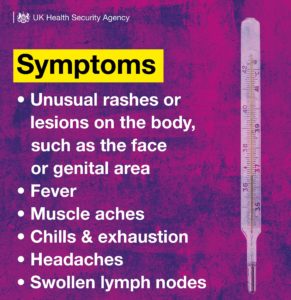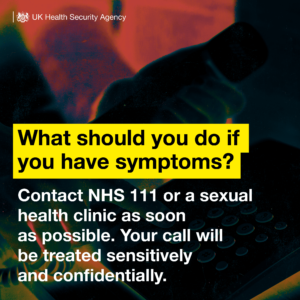Monkeypox – what you need to know
posted by: Don Leslie
Monkeypox is a rare infectious disease, but there are a number of cases in the UK. That number is rising.
Monkeypox is a viral infection usually associated with travel to West Africa. It is usually a mild self-limiting illness, spread by very close contact [including sexual contact] with someone with Monkeypox and most people recover within a few weeks. Similarly to COVID the virus can be present initially without symptoms and still be able to be passed on to close contacts.
The risk to the UK population is low. However, recent cases are predominantly in gay, bisexual and other men who have sex with men (MSM). We are advising MSM to be alert to any unusual rashes or lesions on any part of their body, especially their genitalia, and to contact NHS 111 or their local sexual health service if they have relevant symptoms:
Symptoms
• Unusual new rashes or lesions on the body, especially if they have originate on the face or genitals and spread
• Fever
• Muscle aches
• Chills and exhaustion
• Headaches
• Swollen lymph nodes
Actions you can take:
If you think you have Monkeypox symptoms and are from a known current at-risk group:
- Avoid close personal or sexual contact with others until you know that this is not Monkeypox.
- Contact NHS 111 immediately and your enquiry will be treated sensitively and confidentially
- You can also contact your local sexual health service for advice




Get set for summer!
Heading to a festival this summer? Have safer festival fun by signing up for the Eddystone Trust free condoms for […]

Bank Holiday information
All Devon Sexual Health clinics will be closed on Monday 27th May for the Bank Holiday. When our clinics are […]

#StopItNow campaign returns this March
The Stop It Now campaign is aimed at deterring online child sexual abuse. The campaign is a project of the […]

New time for Exeter Young Person clinic.
From 4 March, the Young Person drop-in clinic at Devon Sexual Health will be held every Tuesday from 3.30pm – […]

